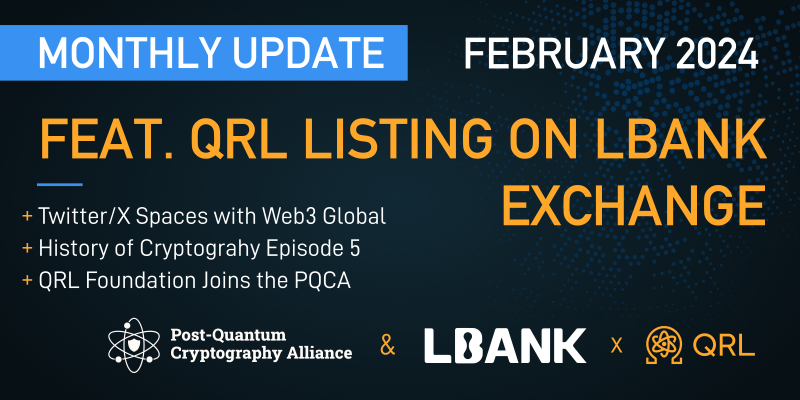QRL Monthly: feat. QRL Listing on LBank, February 2024

1st March 2024
Table of Contents
Highlights
QRL Joins Forces with LBank!

We are thrilled to announce a significant milestone for Quantum Resistant Ledger (QRL) with a listing on LBank Cryptocurrency Exchange — bringing QRL to a broader audience and providing our community with more opportunities to engage with our blockchain.
Additional details below:
- Deposit Open: February 29th, 12:00 UTC
- Trading Open: March 1st, 12:00 UTC
- Withdrawal Open: March 2nd, 12:00 UTC
Check out the listing announcement or join the trading event hosted by LBank. Plus, keep an eye out for upcoming opportunities with Learn to Earn and Flexible Staking.
QRL Foundation Joins PQCA to Boost Post-Quantum Cryptography Adoption and Innovation

The QRL Foundation is happy to be a member of PQCA, a linux foundation project to advance the adoption of post-quantum cryptography, by producing high-assurance software implementations of standardized algorithms, and supporting the continued development and standardization of new post-quantum algorithms with software for evaluation and prototyping.
This proactive approach ensures that as quantum computing becomes more prevalent, our digital assets, financial transactions, and data remain secure against potentially groundbreaking quantum threats.
Media
History of Cryptography: Behind The Code - Episode 5
Here in Episode #5, we move all the way from early days of the internet through the how Digital Signature Algorithms work and what the future may look like for cryptographic security once sufficiently powerful enough quantum computers arrive in the future.
Twitter/X Web3 Global
🔥 Are u ready for Web3 Global Talks?
— Web3 Global (@web3globalmedia) February 29, 2024
🎙️ Our Guests: @Vybz_Gr, @EtherLandID, @PawChain, @kunjitweets, @QRLedger, @ElectraProtocol, @welistdigital, @hiveblocks, @nomadfulcrum, @cheqd_io https://t.co/cdaPpEA9LD
We have also partnered with Web3 Global - @web3globalmedia, and explored engaging topics that resonate with both enthusiasts and skeptics of blockchain technology. Our first episode, we debated the pros and cons of “What Makes Crypto Fun,” and delved into the excitement and innovation driving the world of cryptocurrency. In the second episode, we tackled the debate on “Doxxed or Undoxed, Which is Better?”, or transparency versus anonymity in blockchain projects.
Quantum News
Apple adds PQ3 quantum-resistant encryption to iMessage

On 27 Feb 2024: Apple has implemented a new post-quantum cryptographic protocol, PQ3, to iMessage, aiming to protect against potential quantum computing threats that could break current encryption methods. This protocol, which combines with the existing Elliptic Curve Cryptography, introduces a hybrid model to ensure robust protection against both current and future quantum attacks. PQ3 features innovations like periodic rekeying to enhance security further, making it one of the most secure at-scale messaging protocols available. - bleepingcomputer.com
DeepMind taps the power of its AI to accelerate quantum computers

On 26 Feb 2024: - thenextweb.com
Russian Scientists Expect a 50-Qubit Quantum Computer by End of 2024

On 24 Feb 2024: - thequantuminsider.com
NVIDIA Accelerates Quantum Computing Exploration at Australia's Pawsey Supercomputing Centre

On 18 Feb 2024: NVIDIA and Australia's Pawsey Supercomputing Centre are collaborating to accelerate quantum computing research. This collaboration will leverage NVIDIA's cutting-edge technology, including the CUDA Quantum platform and Grace Hopper Superchips, to conduct research in this field. The goal of this collaboration is to achieve breakthroughs in quantum computing, which has the potential to revolutionize many industries. - nvidianews.nvidia.com
Breakthrough in single-photon integration holds promise for quantum computing, cryptography

On 13 Feb 2024: The recent study highlights a breakthrough in quantum photonics, demonstrating significant progress in integrating single-photon sources on-chip at room temperature, which is crucial for advancing quantum computing, cryptography, and sensing.
By employing a hybrid metal–dielectric bullseye antenna for exceptional photon directionality, the research showcases a method for efficient photon back-excitation and coupling, using either colloidal quantum dots or nanodiamonds as single-photon emitters. Achieving front collection efficiencies of about 70% with low numerical aperture optics, this innovation simplifies the integration of quantum light sources into practical quantum systems, promising to accelerate the development of quantum photonic devices. The research, led by Boaz Lubotzky and Prof. Ronen Rapaport, alongside international collaborators, represents a pivotal advancement in quantum technology applications, as published in Nano Letters. - phys.org
Reducing the Number of Qubits in Quantum Factoring

On 13 Feb 2024: The paper presents an optimization for reducing the number of qubits required in quantum factoring, specifically targeting Shor's algorithm. By employing a combination of techniques, including May and Schlieper's truncation and the Ekerå-Håstad variant, the authors achieve a significant reduction in qubit requirement to factor an RSA-2048 instance, potentially using less than 1700 qubits - iacr.org
US firm plans to build 10,000 qubit quantum computer by 2026

On 05 Feb 2024: QuEra Computing, a Boston-based company, aims to revolutionize computing with quantum technology. They plan to launch a 10,000 qubit quantum computer by 2026, surpassing the capabilities of today's fastest supercomputers.
QuEra's roadmap includes launching a quantum computer with 256 physical qubits and 10 logical qubits this year, followed by a 3,000-qubit quantum computer in 2025.
by 2026, QuEra wants to unleash the 10,000 physical qubits quantum computer with 100 logical qubits. The company is confident that not only will this machine compute without errors, but it will supersede the capabilities of supercomputers today. - interestingengineering.com
Changelog
theQRL/theqrl.org
- [90d84] Quantum news update
- [df894] Add membership to PQCA
- [3d28b] Fix LoE link
- [30750] QRL Weekly, 2024-February-13
1st March 2024